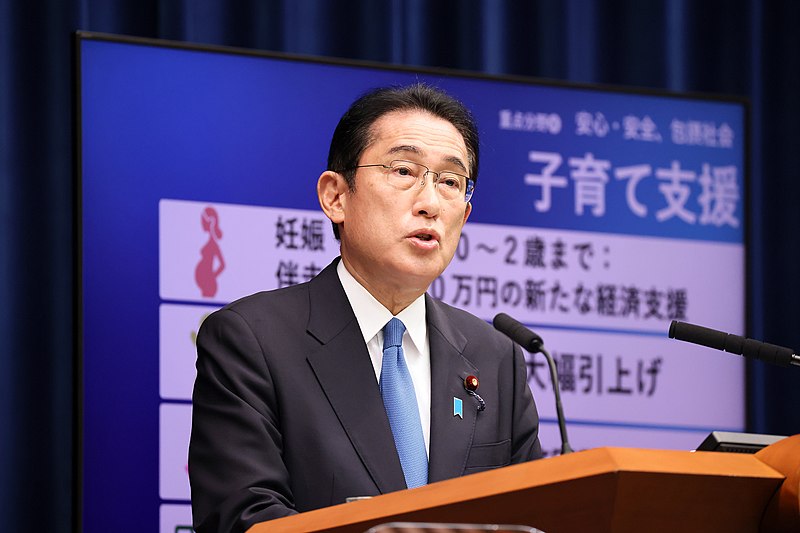Japanese Prime Minister Fumio Kishida said that China’s actions in the region have increasingly infringed on Japan’s sovereignty, escalating tensions. Kishida also stressed the importance of peace and stability in the Taiwan Strait, and also expressed concern over the alleged human rights abuses of the Uyghur Muslim minorities.
Kishida was in attendance at the East Asia Summit in Cambodia over the weekend. The summit groups 18 countries that make up half of the global economy including Southeast Asian countries, and the three major economies the United States, Japan, and China. In his remarks, Kishida said China’s activities in the region have increasingly breached Japan’s sovereignty, citing China’s activities in the East China Sea.
“There has been continued, increasing actions by China in the East China Sea that violate Japan’s sovereignty. China also continues to take actions that heighten regional tension in the South China Sea,” said Kishida during the meeting, according to a statement by the Japanese foreign ministry.
Kishida also expressed “serious concern” over the human rights situation of the Uyghur minority in China’s Xinjiang province. Beijing has denied the allegations of human rights abuses of the ethnic minority and deployed a delegation to Geneva to dispute the findings of the United Nations human rights office.
Kishida also echoed the remarks by US President Joe Biden, stressing the importance of peace and stability in the Taiwan Strait as well as a free and open Indo-Pacific region. China has asserted control over the Strait as well as the majority of the South China Sea, angering the surrounding countries that have overlapping claims.
Kishida met with Biden on the sidelines of the summit and the two leaders agreed to strengthen their alliance in the face of shared concerns such as the ongoing war in Ukraine, the missile launches by North Korea, and tensions in the South and East China Seas.
“We agreed to strengthen the deterrent strength and effectiveness of the US-Japan alliance amid mounting challenges to the security of the region,” Kishida told reporters, adding that they reaffirmed their opposition to a unilateral change to the status quo as well as Russia’s nuclear threats.



 Norway Opens Corruption Probe Into Former PM and Nobel Committee Chair Thorbjoern Jagland Over Epstein Links
Norway Opens Corruption Probe Into Former PM and Nobel Committee Chair Thorbjoern Jagland Over Epstein Links  Iran–U.S. Nuclear Talks in Oman Face Major Hurdles Amid Rising Regional Tensions
Iran–U.S. Nuclear Talks in Oman Face Major Hurdles Amid Rising Regional Tensions  Trump Backs Nexstar–Tegna Merger Amid Shifting U.S. Media Landscape
Trump Backs Nexstar–Tegna Merger Amid Shifting U.S. Media Landscape  Trump Signs Executive Order Threatening 25% Tariffs on Countries Trading With Iran
Trump Signs Executive Order Threatening 25% Tariffs on Countries Trading With Iran  U.S.-India Trade Framework Signals Major Shift in Tariffs, Energy, and Supply Chains
U.S.-India Trade Framework Signals Major Shift in Tariffs, Energy, and Supply Chains  Trump Endorses Japan’s Sanae Takaichi Ahead of Crucial Election Amid Market and China Tensions
Trump Endorses Japan’s Sanae Takaichi Ahead of Crucial Election Amid Market and China Tensions  TrumpRx Website Launches to Offer Discounted Prescription Drugs for Cash-Paying Americans
TrumpRx Website Launches to Offer Discounted Prescription Drugs for Cash-Paying Americans  US Pushes Ukraine-Russia Peace Talks Before Summer Amid Escalating Attacks
US Pushes Ukraine-Russia Peace Talks Before Summer Amid Escalating Attacks  Trump Signs “America First Arms Transfer Strategy” to Prioritize U.S. Weapons Sales
Trump Signs “America First Arms Transfer Strategy” to Prioritize U.S. Weapons Sales  Trump Lifts 25% Tariff on Indian Goods in Strategic U.S.–India Trade and Energy Deal
Trump Lifts 25% Tariff on Indian Goods in Strategic U.S.–India Trade and Energy Deal  U.S. to Begin Paying UN Dues as Financial Crisis Spurs Push for Reforms
U.S. to Begin Paying UN Dues as Financial Crisis Spurs Push for Reforms  Federal Judge Restores Funding for Gateway Rail Tunnel Project
Federal Judge Restores Funding for Gateway Rail Tunnel Project  India–U.S. Interim Trade Pact Cuts Auto Tariffs but Leaves Tesla Out
India–U.S. Interim Trade Pact Cuts Auto Tariffs but Leaves Tesla Out  Trump Allows Commercial Fishing in Protected New England Waters
Trump Allows Commercial Fishing in Protected New England Waters  Jack Lang Resigns as Head of Arab World Institute Amid Epstein Controversy
Jack Lang Resigns as Head of Arab World Institute Amid Epstein Controversy  TrumpRx.gov Highlights GLP-1 Drug Discounts but Offers Limited Savings for Most Americans
TrumpRx.gov Highlights GLP-1 Drug Discounts but Offers Limited Savings for Most Americans  Trump’s Inflation Claims Clash With Voters’ Cost-of-Living Reality
Trump’s Inflation Claims Clash With Voters’ Cost-of-Living Reality 































